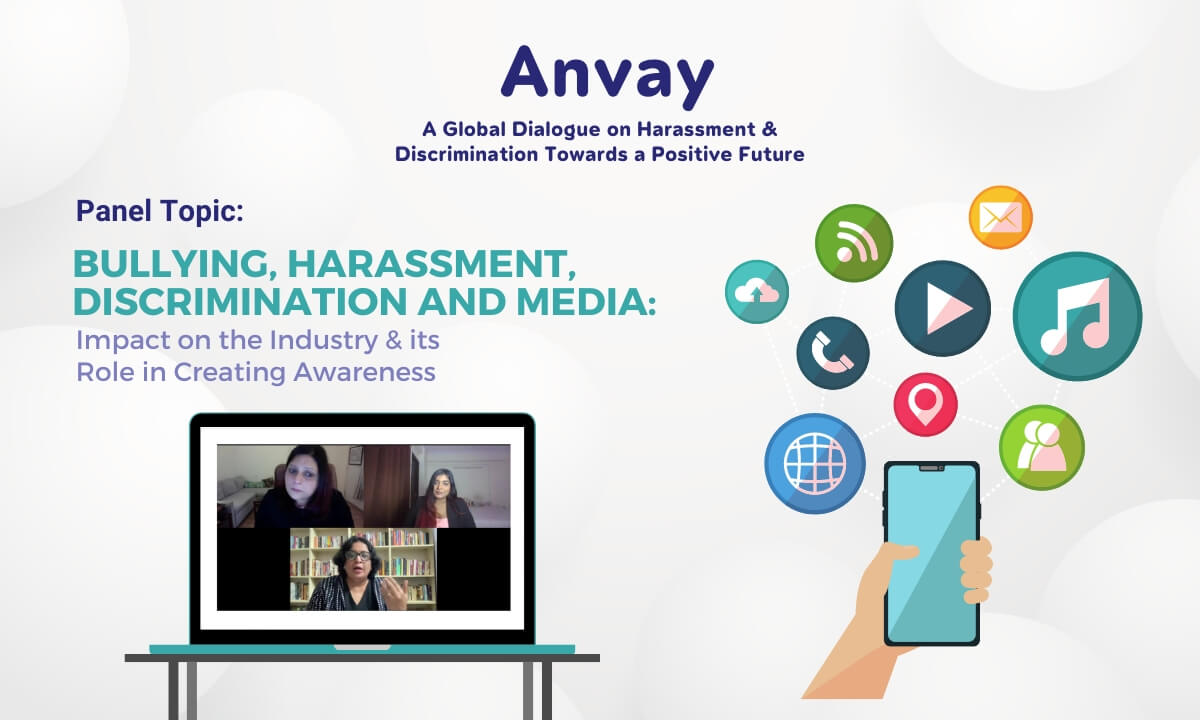The panel discussion “Bullying, Harassment, Discrimination and Media: Impact on the Industry & its Role in Creating Awareness,” at Anvay, featured insightful contributions from:
- Kopal Naithani, Founder/ Director – Superfly Films.
- Rekha Balakrishnan, Lead Editor: HerStory and SocialStory.
- Oshi Saxena, Sub-Editor, SheThePeople.
The panelists delved into the physical, mental, and online harassment that women face, often leading to the internalization of blame and the normalization of unacceptable behavior.
Challenges in the Workplace
- Underrepresentation in Leadership: The film industry has a notable lack of female founders in production houses, highlighting the male-dominated nature of the field. Overcoming this barrier presents significant challenges for women.
- Maternity Leave Challenges: Women on maternity leave often face pressure to quit or return to work immediately, with insensitive comments highlighting issues only women experience. This treatment can make women feel like a burden to their workplaces.
- Online Harassment: Female journalists face online bullying and trolling, which has become a pervasive aspect of their professional lives. Despite this, they have a platform to voice their experiences, empowering them to advocate for those without a voice.
- Consequences of Cyberbullying: Cyberbullying has led to tragic outcomes, including suicides. Media reports have begun to address how cyberbullying can have severe consequences, fostering a greater understanding of the issue.
Evolving Media Narratives
- Changing Media Language: The portrayal of gender in media has evolved, with content creators taking their responsibilities seriously. There is growing awareness of the terminology and connotations used in discussions about gender issues.
- Responsibility in Reporting: Journalists must approach sensitive topics with empathy and sensitivity, ensuring that coverage is respectful and constructive.
- Highlighting Positive Stories: Emphasizing positive stories is crucial for journalists, as these narratives can inspire individuals who may come across them while strolling through their devices. Positive content serves as a source of motivation.
- Impact of the #MeToo Movement: The #MeToo movement has shifted media narratives, moving away from viewing women solely as victims to recognizing their struggle for justice. This includes acknowledging intersectionality, where women face discrimination not just based on gender but also due to race, sexual orientation, and disabilities.
The Importance of Objectivity in Media
- Challenges to Objectivity: The notion of strict objectivity is increasingly questioned, as journalists’ unique experiences and perspectives can influence their reporting. Critics argue that true neutrality is unattainable, and that the media must challenge power dynamics and inequalities.
- The Role of Media in Addressing Social Issues: Objectivity is crucial when reporting on sensitive issues such as race, gender, and sexuality. A simplistic “both-sides-ism” approach can be damaging, failing to challenge existing inequalities.
- The Responsibility of Journalists: Journalists are encouraged to be transparent about their experiences and biases, fostering trust and credibility while providing a nuanced understanding of the stories reported.
- Evolving Standards in Journalism: As the media landscape evolves, so must the standards of objectivity. Emphasizing fairness, accuracy, and context over strict neutrality can lead to more responsible reporting that reflects the complexities of modern society.
The media serves as a powerful tool for raising awareness about harassment and discrimination. By focusing on responsible reporting and promoting positive narratives, the industry can contribute to a more equitable and understanding society.
As we move forward, it is essential for media professionals to uphold their responsibility in creating a more equitable and respectful discourse around harassment and discrimination, ultimately empowering individuals to share their stories and seek justice.
Authored by Gomathi Sridevi Radhakrishnan, Content Writer Intern, The Legal Swan.


